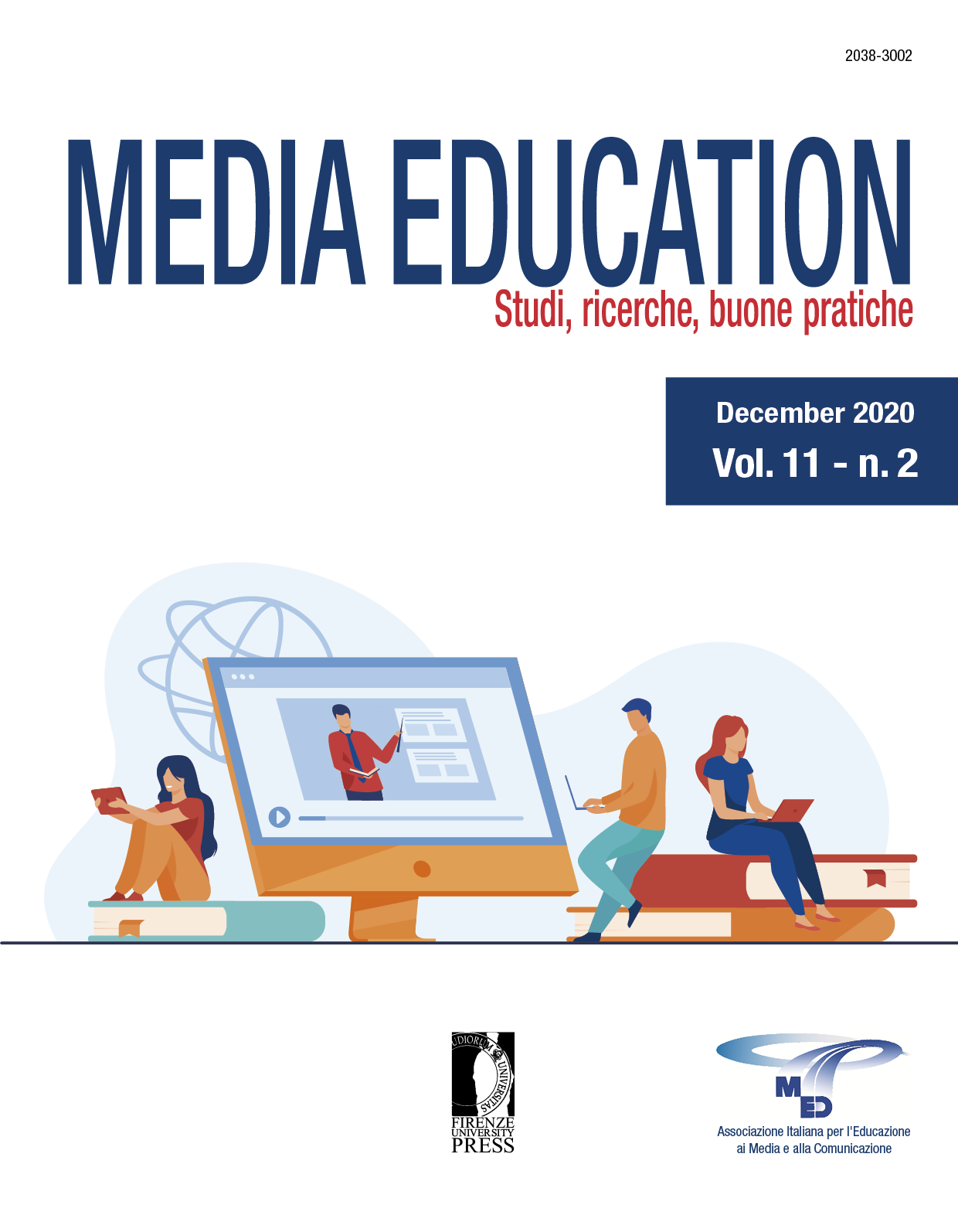Published 2020-11-02
Keywords
- Digital Media,
- Young Refugees,
- COVID-19,
- School,
- Youth Welfare
- Distance Education,
- child and youth welfare,
- online learning ...More
Abstract
This article focuses the educational settings in the everyday life of young refugees in the context of distance education under the circumstances of the COVID-19 pandemic in Germany. It explores dimensions and intensifications of education-related digital inequality during this period in formal and non-formal educational settings. Based on ethnographic interviews with teachers, young refugees and social workers, different dimensions of inequality as well as interrelations between informal (leisure), non-formal (child and youth welfare) and formal (school) educational contexts for empowering the educational participation of young refugees, especially regarding online learning, are discussed. The empirical data show that during the period of distance education the specific needs of young refugees are only taken into account to a limited extent and thus increasing risks of exclusion from education emerge. Lack of technical access, media expertise, language skills and personal support turn out to be major challenges in enabling educational participation of vulnerable groups such as young refugees. Therefore, educational policy at federal and national level in Germany needs to outline a scheme on how to meet these challenges by further developing non-formal as well as formal educational support structures.
References
Bitkom (2020). Schul- und Weiterbildung in der Corona-Krise, Retrieved August 11, 2020 from https://www.bitkom.org/sites/default/files/2020-04/20200402_bitkom-stellungnahme_akuter-handlungsbedarf-schul-und-weiterbi.pdf
BMBF (2019). Wissenswertes zum DigitalPakt Schule. Retrieved August 11, 2020, from https://www.bmbf.de/de/wissenswertes-zum-digitalpakt-schule-6496.html
BMBF (2020). Karliczek: In Zeiten von Corona fördern wir digitales Lernen wie noch nie zuvor. Retrieved August 11, 2020, from https://www.bmbf.de/de/karliczek-in-zeiten-von-corona-foerdern-wir-digitales-lernen-wie-noch-nie-zuvor-11453.html
Brake, A., & Büchner, P. (2011). Bildung und soziale Ungleichheit. Kohlhammer.
Eickelmann, B., Bos, W., Gerick, J., Goldhammer, F., Schaumburg, H., Schwippert, K., Senkbeil, M., & Vahrenhold, J. (Eds.) (2019). ICILS 2018 #Deutschland – Computer- und informationsbezogene Kompetenzen von Schülerinnen und Schülern im zweiten internationalen Vergleich und Kompetenzen im Bereich Computational Thinking. Waxmann.
Falzon, M.-A. (2009). Multi-sited Ethnography. Ashgate Publishing Limited.
Fraillon, J., Ainley, J., Schulz, W., Friedman, T., & Gebhardt, E. (2014). Preparing for Life in a Digital Age. The IEA International Computer and Information Literacy Study International Report. Retrieved August 11, 2020, from https://research.acer.edu.au/cgi/viewcontent.cgi?article=1009&context=ict_literacy
Friedrichs-Liesenkötter, H., & Müller, F. (2018): Die Bedeutung digitaler Medien für Jugendliche mit Fluchterfahrung. Migration und Soziale Arbeit, 40(4), 316–324.
Henrichwark, C. (2009). Der bildungsbezogene mediale Habitus von Grundschulkindern. Retrieved August 11, 2020, from http://elpub.bib.uni-wuppertal.de/servlets/DocumentServlet?id=1025
Hujran, O., Aloudat, A., Al-Hennawi, H., & Ismail, H. (2013). Challenges to E-learning Success: The Student Perspective. Atlantis Press.
Iske, S., & Kutscher, N. (2020). Digitale Ungleichheiten im Kontext Sozialer Arbeit. In N. Kutscher, F. Siller, T. Ley, A. Tillmann, U. Seelmeyer, & I. Zorn (Eds.), Handbuch Digitalisierung und Soziale Arbeit (pp. 115–128). Beltz.
Kessl, F., Kutscher, N., Otto, H.-U., & Ziegler, H. (2004). Bildungsprozesse im sozialen Kontext unter dem Aspekt der Bedeutung des Sozialraums für das Aufwachsen von Kindern und Jugendlichen: Expertise zum 8. Kinder- und Jugendbericht der Landesregierung Nordrhein-Westfalen. Universität Bielefeld.
Kutscher, N. (2017). Geflüchtete als Zielgruppe medienpädagogischer Arbeit in der digitalisierten Gesellschaft. In S. Eder, C. Mikat & A. Tillmann (Eds.), Software takes command, (pp. 203–217). kopaed Verlag.
Kutscher, N. (2019). Digitale Ungleichheit als Herausforderung für Medienbildung. DDS – Die Deutsche Schule, 111(4), 379–390.
Kutscher, N., & Kreß, L.-M. (2018). The Ambivalent Potentials of Social Media Use by Unaccompanied Minor Refugees. Social Media & Society, 4(1), 1–10.
Leander, K. M., Philips, N. C., & Taylor, H. K. (2010). The Changing Social Spaces of Learning: Mapping New Mobilities. Review of Research in Education, 31(1), 329–394.
Lechner, C., & Huber, A. (2017). Ankommen nach der Flucht. Die Sicht begleiteter und unbegleiteter junger Geflüchteter auf ihre Lebenslagen in Deutschland. DJI e.V.
OECD (2019). Balancing School Choice and Equity: An International Perspective Based on Pisa. OECD Publishing. Retrieved August 11, 2020, from http://www.oecd.org/publications/balancing-school-choice-and-equity-2592c974-en.htm
OECD (2020). Education responses to covid-19: Embracing digital learning and online collaboration. Retrieved August 11, 2020, from https://read.oecd-ilibrary.org/view/?ref=120_120544-8ksud7oaj2&title=Education_responses_to_Covid-19_Embracing_digital_learning_and_online_collaboration
Rauschenbach, T., Leu, H., Lingenauber, S, Mack, W., Schilling, M., Schneider, K., & Züchner, I. (2004). Konzeptionelle Grundlagen für einen Nationalen Bildungsbericht: Non-formale und informelle Bildung im Kindes- und Jugendalter. BMBF.
Robeyns, I. (2005). The Capability Approach: a theoretical survey. Journal of Human Development, 6(1), 93–114.
Schatzki, T. R. (2002). The site of the social: a philosophical account of the constitution of social life and change. Pennsylvania State University Press.
Schmid, U., Goertz, L., & Behrens, J. (2017). Monitor Digitale Bildung: Die Schulen im digitalen Zeitalter. Bertelsmann Stiftung.
Skorsetz, N., Bonanati, M., & Kucharz, D. (Eds.) (2020). Diversität und soziale Ungleichheit. Herausforderungen an die Integrationsleistung der Grundschule. VS-Verlag für Sozialwissenschaften.
Strauss, A., & Corbin, J. (1996). Grounded Theory: Grundlagen Qualitativer Sozialforschung. Beltz.
Szreter, S., & Woolcock, M. (2004). Health by association? Social capital, social theory, and the political economy of public health. International Journal of Epidemiology, 33(4), 650–667. Retrieved August 11, 2020, from https://academic.oup.com/ije/article/33/4/650/665431
Vaughan, (2020). An uneven pandemic. New Scientist, 246(3277), 8–9. Retrieved August 11, 2020, from https://www.sciencedirect.com/science/article/pii/S0262407920307041
Telekom Stiftung (2020). „Schule zu Hause“ in Deutschland. Bestandsaufnahme im Corona-Lockdown aus Perspektive der Schüler/-innen und Eltern. Retrieved August 11, 2020, from https://www.telekom-stiftung.de/sites/default/files/files/media/publications/Ergebnisbericht-Homeschooling.pdf
UNHCR (2020). Während COVID-19-Pandemie brauchen vertriebene Kinder mehr Unterstützung denn je. Retrieved August 11, 2020, from https://www.unhcr.org/dach/de/42555-waehrend-covid-19-pandemie-brauchen-vertriebene-kinder-mehr-unterstuetzung-denn-je.html

